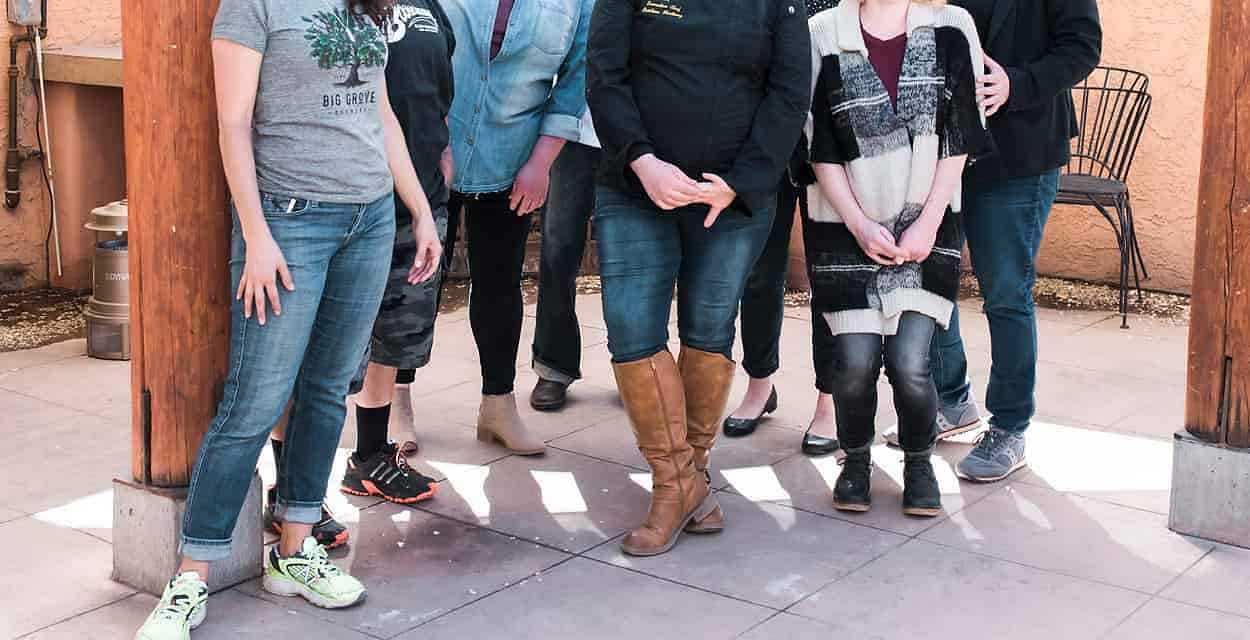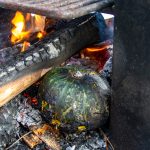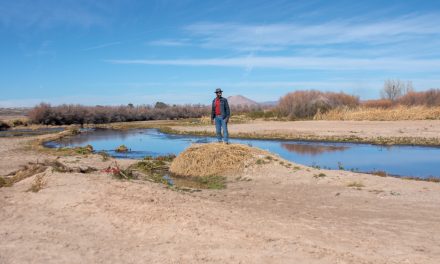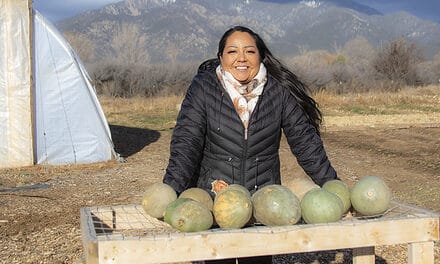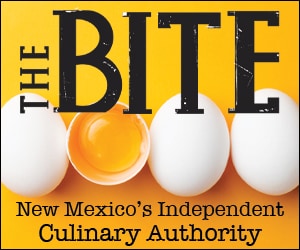Seven Badass Women Talk About Their Kitchens
Virginia Scharff, Moderator and Introduction · Briana Olson, Transcription
Photos by Stacey M. Adams

Top left, clockwise: Marie Yniguez, Eliza Esparza, Jen Doughty, Nelle Bauer, Noela Figueroa, Carrie Eagle, Cristina Martinez, and Cherie Montoya.
On a balmy April afternoon, I sat down at Farm & Table in Albuquerque’s North Valley with a group of some the most accomplished chefs in New Mexico. We discussed a wide range of topics, from leadership skills to New Mexico’s food scene to what the #MeToo movement means for the restaurant business. Though their personalities, training, experience, and opinions vary widely, they share the thoughtfulness, professionalism, and drive for excellence that produces great food and memorable hospitality. As it happens, they are all women with a keen understanding of the challenges for success in the macho, buccaneering culture that is today’s #cheflife. They see what women bring to restaurant kitchens, even as they prefer to be known simply as “chefs,” cooking soulful food you’ll want to eat. -Virginia Scharff
Virginia Scharff, Distinguished Professor of History, University of New Mexico
Cherie Montoya, Owner of Farm & Table in Albuquerque
Carrie Eagle, Chef at Farm & Table in Albuquerque
Eliza Esparza, Sous Chef at Farina Pizzeria in Albuquerque
Jen Doughty, Chef at the Palace Restaurant and Saloon in Santa Fe
Noela Figueroa, Chef/owner of Bodega Prime in Santa Fe
Cristina Martinez, Chef at El Monte Sagrado in Taos
Marie Yniguez, Chef/owner of Slow Roasted Bocadillos in Albuquerque
Nelle Bauer, Co-owner and co-chef at Frenchish in Albuquerque

Left to right: Eliza Esparza and Virginia Scharff.
Virginia: What’s your first food memory?
Noela: I cooked a scrambled egg. I think I was four because I pulled a chair up to the stove, and my mother snapped a picture of me, and I look horrified that she’d discovered me.
Marie: I was gonna say chorizo and eggs. My mom worked constantly so it was me and my sister and my brother. My sister used to make us flautas, tacos, just normal New Mexico cooking. . . . Or my mom and my grandma in the kitchen, making tortillas—
Cristina: My grandma always had a stack of tortillas. Beans and chile going all the time, for anyone who dropped by.
Jen: My first time eating real food—I grew up in a military family, so we had all this commissary-style food—but eating something for real was cabbage and sausage. But I’d say the most formative was coming to New Mexico at seventeen, and the food drew me . . . and the culture and atmosphere that comes with the food.
Eliza: I would say red chile enchiladas; I even have a burn from trying to help my mom fry the tortillas. I recall just sitting on the stool, watching her. Making red chile took awhile so we’d hang out, talking. That’s the first time I saw the love you put into food.
Cristina: That’s what’s awesome—from the female perspective of cooking, it’s so emotional. My grandma put love in, and my mom put love in; it’s like the best part of having kids, for them, was the feeding time.
Virginia: It’s interesting how you’re talking about emotions, saying cooking is love, yet every one of you runs a business in the toughest business I know about. How do you find the will to persist?
Marie: It’s a love-hate relationship. If you’re lucky you’ve got friends and family who push you to keep going. And then you have those people that doubt you, that think you can’t do this, and it’s gonna push you, and you prove them wrong. And that’s one thing for me that’s a force. Being lesbian, being brown, being a single mom . . . it’s been hard. When I read articles about people like you guys, I’m like, damn!
Noela: I’ve worked under male chefs in male kitchens for the majority of my career. Very rigorous environments where people would holler. The man I apprenticed under would wave knives and make people cry. . . . It was important to rewrite that dynamic in my own business because it was so heartbreaking and it would cause me to question why I was in this industry. Part of what keeps me going is that I feel I have a responsibility to my crew—it is a team.
Marie: You’re not just feeding yourself, you’re feeding all their families.
Jen: And I think there’s a need for the women superpowers to start taking control, putting our voices out in the community. We need more family atmosphere.
Cristina: It’s that bond that women create in the kitchen. They’re not just employees; you grow together, you move together, it’s this cohesive family, this awesome dynamic that women bring. It kind of rocks the boat; people have to get their brains completely rewired. But once it happens, it’s like, “Yes!”
Carrie: And that’s a huge part of our responsibility—passing along this sense of, yeah, we can be badasses, we can be the best crew around, and we can turn out the most beautiful plates, but it doesn’t have to be a cutthroat environment. And the guys on our core crew—we tease them, it’s the kitchen of brotherly love.

Left to right: Noela Figueroa and Jen Doughty.
Virginia: What I’m hearing is there’s a different style of leadership when women are in the lead. At the same time, I know my mom had a look she would give me when I was out of line. She didn’t have to say a word, she’d just give me the look, and that was all I needed. So how do you lead while cultivating that more sensitive, egalitarian, family-driven, caring culture?
Noela: We have an open kitchen.
Nelle: You can’t throw things, you can’t yell.
Noela: There’s no reason for that kind of talk, and there is no discord between the front and back of the house because there’s nowhere to hide. And when people get steamed up, I just look at them and say, “Go take a walk.”
Marie: You give them the look! You know, you give them that look.
Cristina: I have always just wanted respect. Don’t stop listening because I’m a woman. It’s our duty as chefs, and as women chefs, to teach. Teach people, teach cultures, teach respect.
Carrie: When you’re in those moments, you know we talked about the guys with the sharpest knives—we have to rise to the occasion and show every male in our kitchens. And there is an element, of, yeah, I am a woman, and, yeah, I’m gonna push that much harder to drive the point home. But the skill has to be there.
Eliza: When I graduated culinary school, my friend got me a job at Farina, and the sous chef at the time, he was—he’s my good friend now—but he’s the one who I’d say lit the fire for me because he would pick at everything I did. In a way, he motivated me to grow a shell; when I first started, I was very timid and quiet, I was scared, and it was a lot of males, and the oven guy was known as the a-hole, and they were all kind of mean, and I’d like to give them credit. To a certain extent, they pushed me to rise up.
Jen: And that’s where I appreciate all those guys who talked the smack, who pushed and poked, until I was like, you know what, I’m just gonna start working circles around you. I think that’s what makes us all better leaders.
Noela: I also think it’s important—I know what I can do, what I’m capable of, as does my crew, but if I don’t know something, I think it’s okay to say, “I don’t know, but I’m gonna find out” or “What do you know about that?”
Marie: I’ve had the guy with the sharpest knife in the kitchen and everything, and I’ll say, okay, you do it your way and I’ll do it my way, and we’ll see which one comes out better. That’s how you learn. I still learn every single day. I have an all-girl crew. We have one girl . . . [to Eliza] she’s like you were, she’s afraid to get her voice across because she doesn’t want to be the mean one.
Cristina: It takes time.
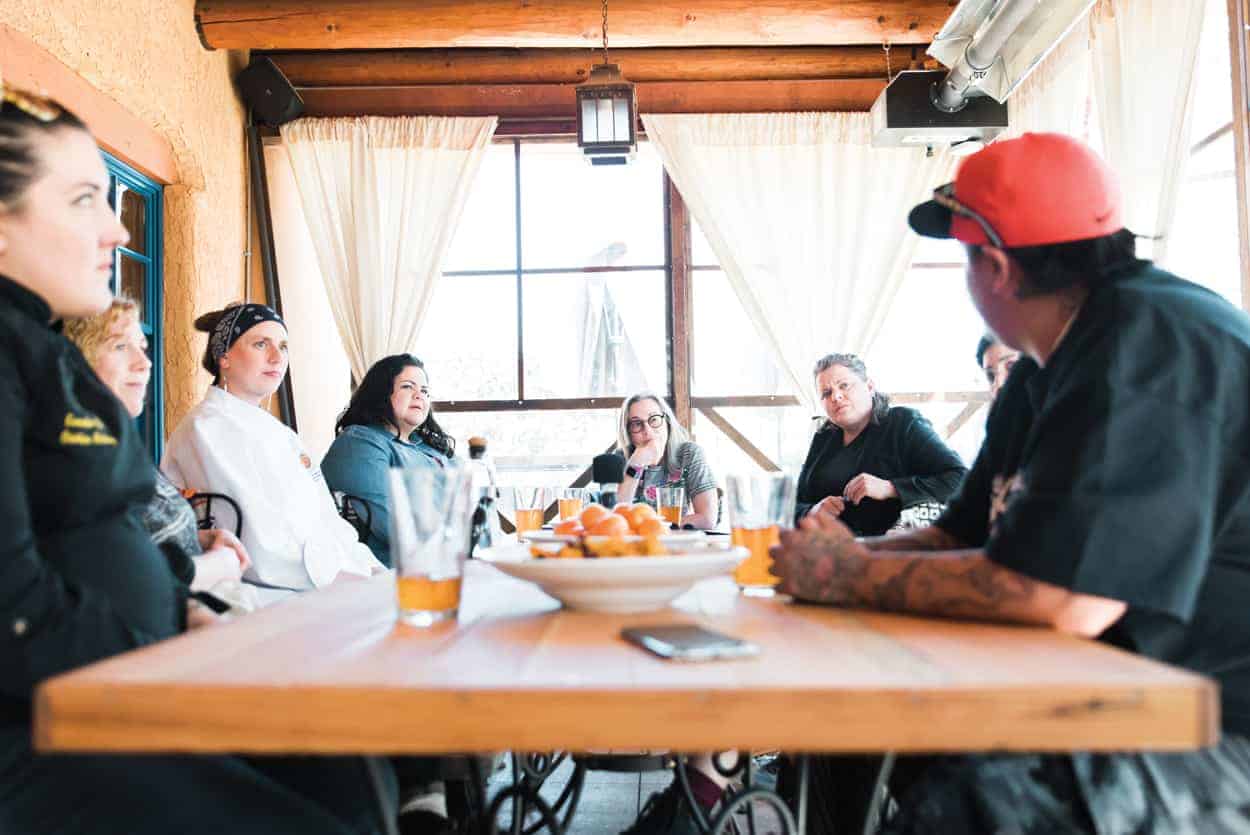
Left to right: Cristina Martinez, Noela Figueroa, Jen Doughty, Eliza Esparza, Virginia Scharff, Carrie Eagle, Nelle Bauer, and Marie Yniguez.
Carrie: It’s that dance, that little gender dance . . . she’s got to find her strength.
Jen: I loved breaking that stigma as a line cook. I would not allow the guys to push me around, and I think that’s how I got a lot of great gigs, with a lot of great chefs. I see a lot of young chefs, even men, they’re intimidated—I’m like, no, you’ve got to be confident if you want thick skin in this.
Cristina: I think the vulnerability, though, is something that’s beautiful too.
Marie: You’ve got to be able to talk to each other. If somebody’s going down on your time, on your line, they better say, “hey, I’m going down, come help me.” That’s a problem with a lot of the egos that go around in the kitchen, they’re like, “I can do this.” No—bro, you need help.
Noela: I always ask—and this is not typical from the male chefs I’ve experienced—but I ask, what do you need from me? How can we make this so that, when you’re in the weeds, you can call me?
Marie: Sometimes you just gotta let ‘em go down. You let ‘em go down so you can say, okay, what did you do wrong.
Nelle: It doesn’t have to be a “what did you learn from this?” It can be me telling them, this is what happened, and then this happened, and this is what you needed to do, but you didn’t, so this happened, and this was the bonfire. Because when you’re in the middle of the weeds, you can’t see anything.
Virginia: We have such a close food community in this state. How might working in New Mexico be different from other places you’ve worked? What does it mean to be here?
Jen: Organization. I cooked in Oregon for a while, and the farm-to-table organization was incredible. Here I’ve found it harder to bridge that gap. It’s easier for the public, but it’s harder for a restaurant. [For example,] depending on that person to deliver your lamb every Tuesday.
Carrie: I think Albuquerque, our local farmers, everyone who participates in that Downtown Growers’ Market, they have dinners, they work together, they try to communicate so that not all six farms I’m ordering from in June have just braising greens. There’s a greater collaborative effort coming from our small farmers, and it’s getting better every single season.
Noela: We’re doing that, with Beneficial [Farms CSA]. They’re doing a dinner in a couple weeks, with industry professionals and farmers, because they cull from all over the state, and it’s to have that conversation, how are we gonna plan for the coming season?
Cristina: Albuquerque is amazing—everyone’s connected in some way, and it’s all kind of through food, and that’s a beautiful part of the culture. In Taos, and it’s not that far away, but it’s like another world. Moving away made me gain appreciation for everyone that’s impacting what’s happening here.
Virginia: Eliza, you came out of CNM’s culinary program, which is, I think, expanding. Is that making an impact, locally?
Carrie: We sat on a panel where we opened a dialogue on how do we get our students into your restaurant. A big issue is that if you have Cheddars offering eighteen dollars an hour because you have a culinary degree, that’s not an applicant I can even look at.
Noela: I did an apprenticeship, and I worked and worked and worked, and I didn’t go to culinary school. And I would get these kids out of a nine-month culinary school, and they were like, I’m a chef, and I’d say, actually, you’re gonna be my plater. I felt sometimes the culinary programs were instilling ideas about what their career was going to be like without giving them the opportunity to hone their skills and prove themselves.
Jen: When I have someone that’s all fancy out of culinary school, I’m like, you’re starting on dish, minimum wage. To humble them a little bit. That’s how I started; in high school, I was a dishwasher.
Marie: Parents aren’t teaching their kids how to go to work anymore; nobody’s out there pulling weeds anymore. In culinary school, that’s what they need to teach them, is this is how you work.
Eliza: I appreciated culinary school. I learned from the people I was with. They were like, I’m gonna graduate, I’m gonna be on the Food Network, I’m gonna be a star, and I was kinda like, I don’t think so. But I did get to network, I did get to meet some people working in the industry, and I got to learn from them. But I think the media, stardom, #cheflife, has a lot to do with kids graduating and not knowing that you have to work for some pretty crappy money, and go home achy, and not have a life, in order to be the #cheflife.
Jen: I did culinary school as a woman cook, because I was having issues where I’d go in kitchens, and they’d put me on pastry. Oh, you’re a chick, so you’re gonna do pastry. But it got my foot in some doors, having that piece of paper and that self-discipline.
Cristina: I went to Le Cordon Bleu and every day was a struggle with male instructors grading me lower just based off my being a female. That was the start of, wow, this is what I’m getting into, and it’s too late, because I already signed that loan, so I’m gonna finish. But CNM offers an inexpensive program. They have beautiful facilities and great instructors. The only thing is they have these six-foot tables, and they have their own mixer…
Jen: This is not reality.
Cristina: You’re gonna get used to duct tape, when you’re a real chef.
Virginia: The biggest news in the business is all the bad behavior on the part of some of the celebrity chefs. How do you feel about this [#MeToo] moment? How do you advance the conversation about creating more power and more creative moments for women in the food business?

Cherie Montoya, Marie Yniguez, Eliza Esparza, Jen Doughty,
Cristina Martinez, Nelle Bauer, Noela Figueroa, and Carrie Eagle.
Jen: Obviously, the cycle is a problem; we need to get clever to break that cycle.
Cristina: I think it’s amazing that people are finally being held responsible for what they’ve done. In this industry, men have been completely untouchable; you can go around as a man screaming and fondling and sexually harassing your staff, and that’s just “the culture.” In the real world, men can’t go around grabbing women, but they’re still doing that in kitchens. I don’t think it should ever be forgotten. It should be constantly brought up so it will never happen again—so no matter how rich you are, no matter how many restaurants you have your name on, you will be held responsible.
Carrie: Fostering the sense of community and the collaborative environment we’re talking about, and teaching our young men, who work for us—it’s as important as bringing along the young
female chefs because growing that awareness impacts everyone who interacts with it.
Noela: I used to work with this French, James Beard–award winner. He was big and he would come in and stare right at my breasts and say, “hello, Noela, how are you today,” and I’d say, “Well, Chef, I’m a little tired, but my breasts are fine.”
Jen: That’s what I mean about being clever . . . you’re bringing
humor and clarity to the situation.
Nelle: I try to remind our staff that we’re in the hospitality industry. To be welcoming and open to our guests—that’s our job. If they’re treating each other a certain way, it gives me pause, that they would treat our guests that way. We’re not slinging something across a counter. You’re feeding these people, nourishing them, and their experience has to be welcoming and loving and caring. Yes, we’re in a kitchen, but that kitchen is part of a restaurant.
Virginia: So, what’s next? What are you most interested in learning about food—a style, working with new ingredients, a technique, what’s lighting your fire right now?
Noela: Butchery. I loved it right from the first time I started doing it.
Marie: I’m learning noodles right now. I’m in love with the noodle bowl.
Jen: I love sauces. All the different moles, chiles . . . that’s something [Mark] Miller taught me. He made me study a hundred different chiles before I could touch his sauces. I’m trying to continue to do that. . . . My chile is no joke.
Cristina: My husband pushes me. He’s also a chef, and he’s crazy meticulous. His attention to detail, his food, is awe-inspiring to me—we push each other to try new things.
Carrie: We’re losing our pastry chef, and I’m looking for someone, but in the interim, I’m looking forward to getting my hands back into making bread every day. On the other side, we end up with a surplus of local produce, and I want to extend our preserving and our pickle program.
Eliza: I’m working on a bar menu for Farina. I’m excited about the farms offering more produce so we can pickle more. I have a place in the walk-in, they call it Eliza’s pickle shelf. Also, I bake our bread and mix our pizza dough on the weekends . . . I don’t really have time to read, but when I do get time, I’d like to read more about baking.
Virginia: Is there anything we haven’t talked about that you want to talk about?
Carrie: Looking around the table, I feel like everyone’s in a strong moment. It feels like we’re all in the stream of what makes us happy.
Cherie: I want to give a shout out to other women in the industry—I want to make sure we can remember to link arms. We need to help be that platform and help shore up other women.
Cristina: I think it’s our responsibility. I’ve been through a lot in this industry. When you start off young as a female, and you want to please everyone, you go through a lot, and I think if you make it out, and you feel stronger, it’s your responsibility to share that.
This discussion has been edited for brevity and clarity.
Edible celebrates New Mexico's food culture, season by season. We believe that knowing where our food comes from is a powerful thing. With our high-quality, aesthetically pleasing and informative publication, we inspire readers to support and celebrate the growers, producers, chefs, beverage and food artisans, and other food professionals in our community.

